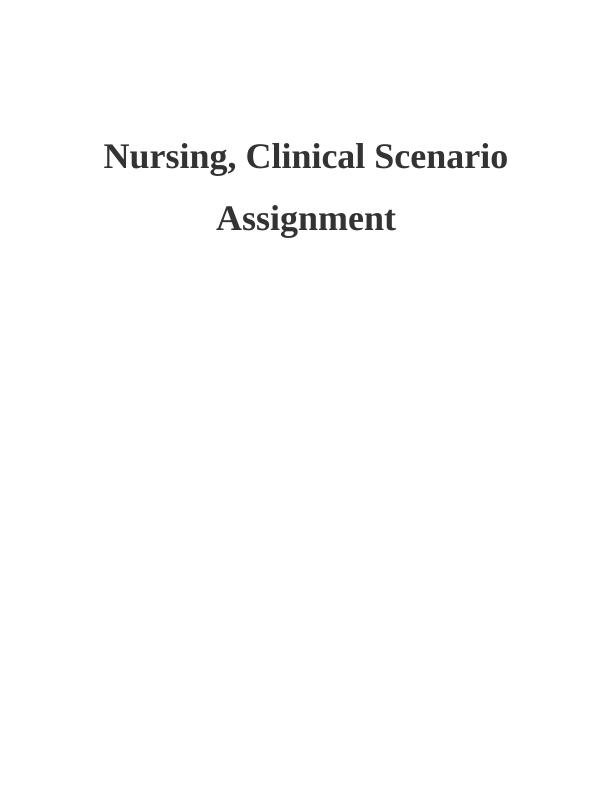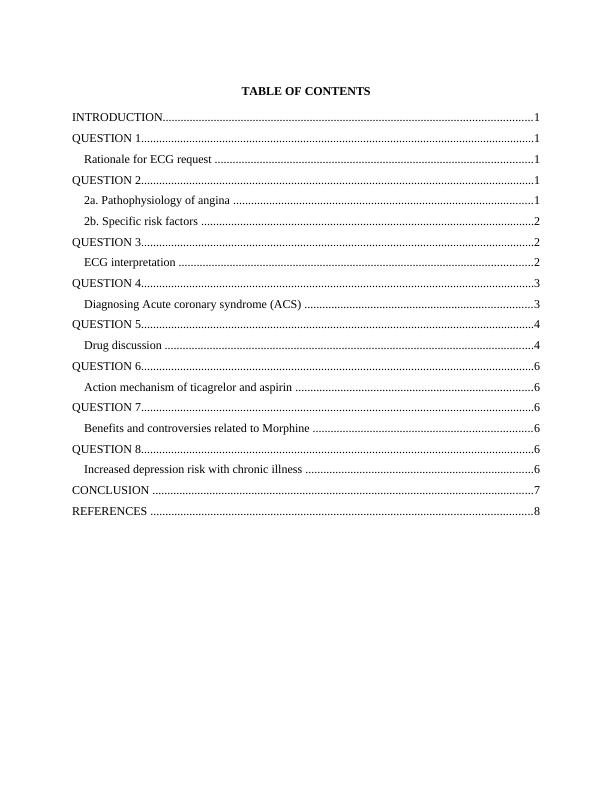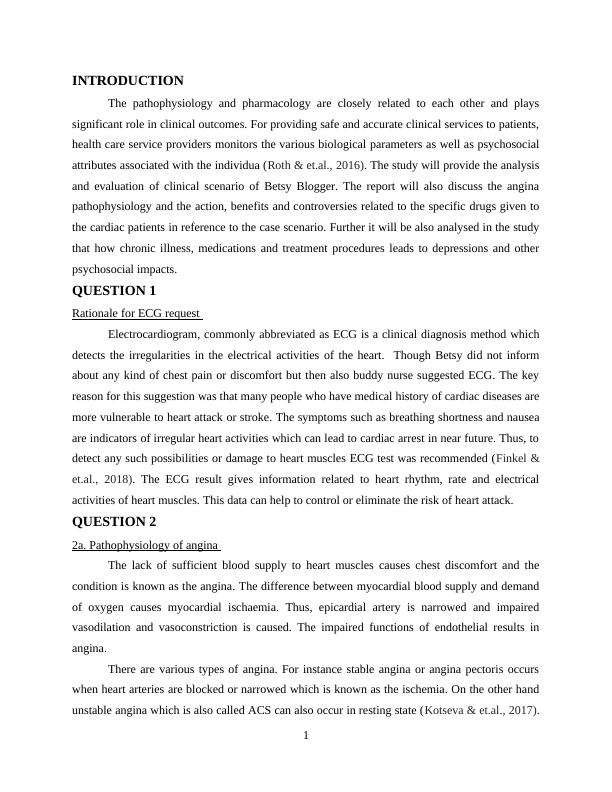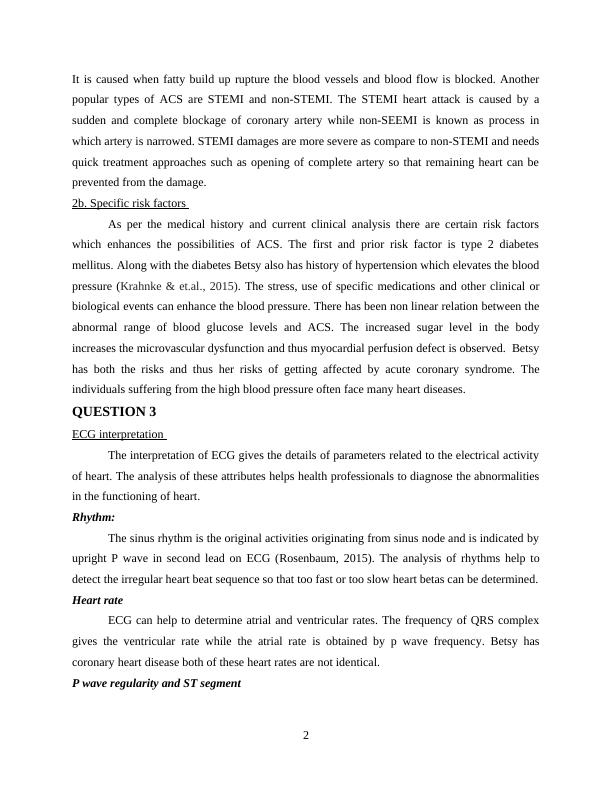Ask a question from expert
Nursing, Clinical Scenario Assignment
15 Pages2983 Words215 Views
Added on 2020-11-23
Nursing, Clinical Scenario Assignment
Added on 2020-11-23
BookmarkShareRelated Documents
Nursing, Clinical Scenario
Assignment
Assignment

TABLE OF CONTENTS
INTRODUCTION...........................................................................................................................1
QUESTION 1...................................................................................................................................1
Rationale for ECG request ..........................................................................................................1
QUESTION 2...................................................................................................................................1
2a. Pathophysiology of angina ....................................................................................................1
2b. Specific risk factors ...............................................................................................................2
QUESTION 3...................................................................................................................................2
ECG interpretation ......................................................................................................................2
QUESTION 4...................................................................................................................................3
Diagnosing Acute coronary syndrome (ACS) ............................................................................3
QUESTION 5...................................................................................................................................4
Drug discussion ...........................................................................................................................4
QUESTION 6...................................................................................................................................6
Action mechanism of ticagrelor and aspirin ...............................................................................6
QUESTION 7...................................................................................................................................6
Benefits and controversies related to Morphine .........................................................................6
QUESTION 8...................................................................................................................................6
Increased depression risk with chronic illness ............................................................................6
CONCLUSION ...............................................................................................................................7
REFERENCES ...............................................................................................................................8
INTRODUCTION...........................................................................................................................1
QUESTION 1...................................................................................................................................1
Rationale for ECG request ..........................................................................................................1
QUESTION 2...................................................................................................................................1
2a. Pathophysiology of angina ....................................................................................................1
2b. Specific risk factors ...............................................................................................................2
QUESTION 3...................................................................................................................................2
ECG interpretation ......................................................................................................................2
QUESTION 4...................................................................................................................................3
Diagnosing Acute coronary syndrome (ACS) ............................................................................3
QUESTION 5...................................................................................................................................4
Drug discussion ...........................................................................................................................4
QUESTION 6...................................................................................................................................6
Action mechanism of ticagrelor and aspirin ...............................................................................6
QUESTION 7...................................................................................................................................6
Benefits and controversies related to Morphine .........................................................................6
QUESTION 8...................................................................................................................................6
Increased depression risk with chronic illness ............................................................................6
CONCLUSION ...............................................................................................................................7
REFERENCES ...............................................................................................................................8

INTRODUCTION
The pathophysiology and pharmacology are closely related to each other and plays
significant role in clinical outcomes. For providing safe and accurate clinical services to patients,
health care service providers monitors the various biological parameters as well as psychosocial
attributes associated with the individua (Roth & et.al., 2016). The study will provide the analysis
and evaluation of clinical scenario of Betsy Blogger. The report will also discuss the angina
pathophysiology and the action, benefits and controversies related to the specific drugs given to
the cardiac patients in reference to the case scenario. Further it will be also analysed in the study
that how chronic illness, medications and treatment procedures leads to depressions and other
psychosocial impacts.
QUESTION 1
Rationale for ECG request
Electrocardiogram, commonly abbreviated as ECG is a clinical diagnosis method which
detects the irregularities in the electrical activities of the heart. Though Betsy did not inform
about any kind of chest pain or discomfort but then also buddy nurse suggested ECG. The key
reason for this suggestion was that many people who have medical history of cardiac diseases are
more vulnerable to heart attack or stroke. The symptoms such as breathing shortness and nausea
are indicators of irregular heart activities which can lead to cardiac arrest in near future. Thus, to
detect any such possibilities or damage to heart muscles ECG test was recommended (Finkel &
et.al., 2018). The ECG result gives information related to heart rhythm, rate and electrical
activities of heart muscles. This data can help to control or eliminate the risk of heart attack.
QUESTION 2
2a. Pathophysiology of angina
The lack of sufficient blood supply to heart muscles causes chest discomfort and the
condition is known as the angina. The difference between myocardial blood supply and demand
of oxygen causes myocardial ischaemia. Thus, epicardial artery is narrowed and impaired
vasodilation and vasoconstriction is caused. The impaired functions of endothelial results in
angina.
There are various types of angina. For instance stable angina or angina pectoris occurs
when heart arteries are blocked or narrowed which is known as the ischemia. On the other hand
unstable angina which is also called ACS can also occur in resting state (Kotseva & et.al., 2017).
1
The pathophysiology and pharmacology are closely related to each other and plays
significant role in clinical outcomes. For providing safe and accurate clinical services to patients,
health care service providers monitors the various biological parameters as well as psychosocial
attributes associated with the individua (Roth & et.al., 2016). The study will provide the analysis
and evaluation of clinical scenario of Betsy Blogger. The report will also discuss the angina
pathophysiology and the action, benefits and controversies related to the specific drugs given to
the cardiac patients in reference to the case scenario. Further it will be also analysed in the study
that how chronic illness, medications and treatment procedures leads to depressions and other
psychosocial impacts.
QUESTION 1
Rationale for ECG request
Electrocardiogram, commonly abbreviated as ECG is a clinical diagnosis method which
detects the irregularities in the electrical activities of the heart. Though Betsy did not inform
about any kind of chest pain or discomfort but then also buddy nurse suggested ECG. The key
reason for this suggestion was that many people who have medical history of cardiac diseases are
more vulnerable to heart attack or stroke. The symptoms such as breathing shortness and nausea
are indicators of irregular heart activities which can lead to cardiac arrest in near future. Thus, to
detect any such possibilities or damage to heart muscles ECG test was recommended (Finkel &
et.al., 2018). The ECG result gives information related to heart rhythm, rate and electrical
activities of heart muscles. This data can help to control or eliminate the risk of heart attack.
QUESTION 2
2a. Pathophysiology of angina
The lack of sufficient blood supply to heart muscles causes chest discomfort and the
condition is known as the angina. The difference between myocardial blood supply and demand
of oxygen causes myocardial ischaemia. Thus, epicardial artery is narrowed and impaired
vasodilation and vasoconstriction is caused. The impaired functions of endothelial results in
angina.
There are various types of angina. For instance stable angina or angina pectoris occurs
when heart arteries are blocked or narrowed which is known as the ischemia. On the other hand
unstable angina which is also called ACS can also occur in resting state (Kotseva & et.al., 2017).
1

It is caused when fatty build up rupture the blood vessels and blood flow is blocked. Another
popular types of ACS are STEMI and non-STEMI. The STEMI heart attack is caused by a
sudden and complete blockage of coronary artery while non-SEEMI is known as process in
which artery is narrowed. STEMI damages are more severe as compare to non-STEMI and needs
quick treatment approaches such as opening of complete artery so that remaining heart can be
prevented from the damage.
2b. Specific risk factors
As per the medical history and current clinical analysis there are certain risk factors
which enhances the possibilities of ACS. The first and prior risk factor is type 2 diabetes
mellitus. Along with the diabetes Betsy also has history of hypertension which elevates the blood
pressure (Krahnke & et.al., 2015). The stress, use of specific medications and other clinical or
biological events can enhance the blood pressure. There has been non linear relation between the
abnormal range of blood glucose levels and ACS. The increased sugar level in the body
increases the microvascular dysfunction and thus myocardial perfusion defect is observed. Betsy
has both the risks and thus her risks of getting affected by acute coronary syndrome. The
individuals suffering from the high blood pressure often face many heart diseases.
QUESTION 3
ECG interpretation
The interpretation of ECG gives the details of parameters related to the electrical activity
of heart. The analysis of these attributes helps health professionals to diagnose the abnormalities
in the functioning of heart.
Rhythm:
The sinus rhythm is the original activities originating from sinus node and is indicated by
upright P wave in second lead on ECG (Rosenbaum, 2015). The analysis of rhythms help to
detect the irregular heart beat sequence so that too fast or too slow heart betas can be determined.
Heart rate
ECG can help to determine atrial and ventricular rates. The frequency of QRS complex
gives the ventricular rate while the atrial rate is obtained by p wave frequency. Betsy has
coronary heart disease both of these heart rates are not identical.
P wave regularity and ST segment
2
popular types of ACS are STEMI and non-STEMI. The STEMI heart attack is caused by a
sudden and complete blockage of coronary artery while non-SEEMI is known as process in
which artery is narrowed. STEMI damages are more severe as compare to non-STEMI and needs
quick treatment approaches such as opening of complete artery so that remaining heart can be
prevented from the damage.
2b. Specific risk factors
As per the medical history and current clinical analysis there are certain risk factors
which enhances the possibilities of ACS. The first and prior risk factor is type 2 diabetes
mellitus. Along with the diabetes Betsy also has history of hypertension which elevates the blood
pressure (Krahnke & et.al., 2015). The stress, use of specific medications and other clinical or
biological events can enhance the blood pressure. There has been non linear relation between the
abnormal range of blood glucose levels and ACS. The increased sugar level in the body
increases the microvascular dysfunction and thus myocardial perfusion defect is observed. Betsy
has both the risks and thus her risks of getting affected by acute coronary syndrome. The
individuals suffering from the high blood pressure often face many heart diseases.
QUESTION 3
ECG interpretation
The interpretation of ECG gives the details of parameters related to the electrical activity
of heart. The analysis of these attributes helps health professionals to diagnose the abnormalities
in the functioning of heart.
Rhythm:
The sinus rhythm is the original activities originating from sinus node and is indicated by
upright P wave in second lead on ECG (Rosenbaum, 2015). The analysis of rhythms help to
detect the irregular heart beat sequence so that too fast or too slow heart betas can be determined.
Heart rate
ECG can help to determine atrial and ventricular rates. The frequency of QRS complex
gives the ventricular rate while the atrial rate is obtained by p wave frequency. Betsy has
coronary heart disease both of these heart rates are not identical.
P wave regularity and ST segment
2

End of preview
Want to access all the pages? Upload your documents or become a member.
Related Documents
ACUTE CORONARY SYNDROMElg...
|12
|3546
|1
Clinical Scenario Assignmentlg...
|13
|3247
|85
Nursing Case Study: Betsylg...
|10
|3121
|160
Pathophysiology: A Clinical Scenariolg...
|15
|2897
|198
Betsy Case Study: Acute Coronary Syndrome and ECG Analysislg...
|10
|3051
|26
Acute Coronary Syndrome: Pathophysiology, Diagnosis, and Treatmentlg...
|13
|3190
|91